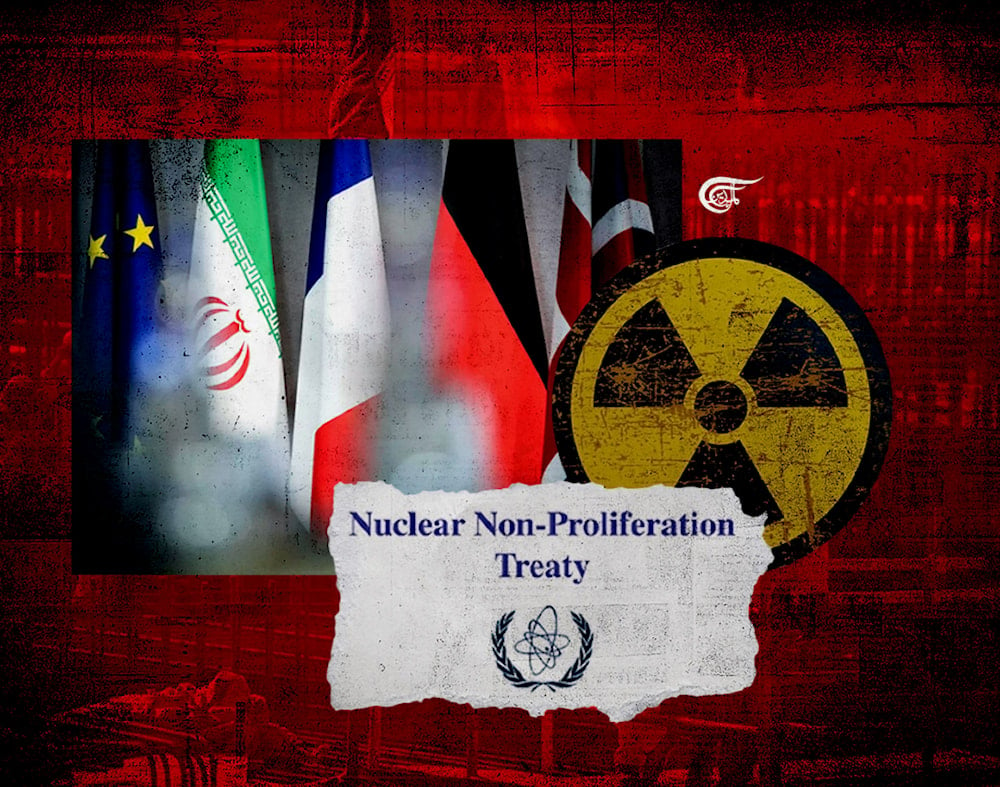Iran and the NPT: Opposition justified
Hannan Hussain argues that Iran’s possible withdrawal from the NPT is a justified response to E3 double standards, snapback sanctions, and Western silence on real nuclear threats in the region.
-

Iran's opposition to the NPT is justified due to the E3’s glaring silence on actual challenges to nuclear security in the region. (Al Mayadeen English; Illustrated by Zeinab el-Hajj)
Following glaring double standards from the E3 (European trio of Germany, France and the United Kingdom) on international peace, Tehran’s growing consideration of a departure from the Non-Proliferation Treaty (NPT) merits focus.
The E3 powers are pushing to reimpose unwarranted sanctions on Iran, the same country that they falsely alleged was non-cooperative on matters of nuclear security and non-proliferation. The pressure tactics from the E3 powers, centered around a “snapback mechanism” for reinforcing sanctions, has been met with firm defiance from within Iran’s parliament: an emergency draft bill calling for Tehran's NPT withdrawal has gathered strength. Unless the E3 and their Western cheerleaders cease in provoking Iran, Tehran has plenty of leverage at its disposal to bring Western sanctions' double-standards out in the open. “As we had previously stated, these countries were already implementing the consequences of the snapback mechanism, including sanctions against us. There is nothing new in this,” Hossein-Ali Haji-Deligani, Deputy Chairman of the Article 90 Committee of Iran’s Parliament, recently stated.
First, opposition to the NPT is justified due to the E3’s glaring silence on actual challenges to nuclear security in the region. "Israel’s" terrorism on Iranian soil, and US shortcomings in honouring core agreements – including the Joint Comprehensive Plan of Action (JCPOA) – collectively suggest that the E3 is quick to resort to sanction threats against Iran without addressing the fundamental irritants to international stability. Preserving Iranian support for the NPT means a consistent sense of support from E3 powers in advancing negotiations that are in line with the interests of all parties concerned. This is the same E3 that has called upon Iran to resume negotiations with the US on a “new nuclear deal,” but shows no signs of upping the pressure on Washington for its state-backed terrorist attacks against three Iranian nuclear facilities.
The move reflects long-standing ill-intent from Washington, which has sought to engage the E3 to negotiate with Iran during periods when the US has been focused on scuttling the essence of any meaningful outcome. Look no further than the maximum pressure campaign: US aggression through unilateral sanctions and a dismal isolation campaign against Iran fell on deaf ears as the E3 offered blunt or near minimal criticism. That campaign was widely criticized from within the US, barring Iran hawks who believe that the US can exercise diplomacy and illegal sanctions imposition in equal measure.
That understanding merits course correction as Iran presents a firm stance on stepping up pressure if its legitimate interests are threatened. The snapback mechanism, after all, is a regressive step as it points to past sanctions and provocations that have defined prolonged periods of tension in nuclear negotiations.
The United States and Western powers have leaned heavily on the mechanism to promote convenient attacks against Iran, including unwarranted efforts to maintain pressure on a country that is unquestionably within its rights to support the economic autonomy, territorial integrity, and international stability priorities within and beyond its borders. Reintroducing the snapback mechanism means that the E3 powers have left nothing to consider in the way of meaningful diplomacy, and thus, the NPT bill should be seen as a legitimate reaction from Iran to the E3’s belligerence and nonchalant attitude towards lasting peace.
The determinants of a workable nuclear deal were long on Iran’s radar and continue to be: Tehran has shown flexibility in talks with the US and E3 powers, even when it was Washington – not Iran – that compromised the spirit of negotiations by backing Israeli schemes to weaken nuclear security, and play into anti-Iranian lobbying. But tangible negotiations are a two-way street: E3 should put the core of its advocacy for international peace by doing away with mechanisms that serve blatant US aggression and illegal sanctions campaigning against Iran. The snapback mechanism is controversial for a reason: it is a violent departure from the determinants of nuclear security rapport, and has been selectively applied by the West to pressure Iran based on a sense of convenience.
This blatant line of action is set for massive pushback as Iran signals that the NPT bill is the bare minimum to E3’s sanctions threat. Tehran, which has seen the West’s brazen double-standards in the NPT’s stated and actual promise, understands that the politics underlying E3’s decision is struggling to shift. For instance, if the NPT’s sanctity was truly on the agenda of the E3, then efforts to promote nuclear security must have fallen in line with the legitimate expectations of Iran and world powers. Their collective consensus-building is central to a rules-based, multilateral decision-making practice. But as the snapback mechanism confirms, E3 is overruling the spirit of multilateralism by resorting to sanctions that have not benefitted negotiations at all.
Thus understood, concessions on the nuclear front must stem from the same powers that have prolonged tacit aggression against Iran. Tehran’s ability to promote more reactive measures in proportion to the aggression exercised by the E3 on snapbacks, should thus be a wake up call: follow suit on effective peacebuilding because Iran’s interests in economy and political self-sufficiency are beyond compromise.

 Hannan Hussain
Hannan Hussain
 5 Min Read
5 Min Read











